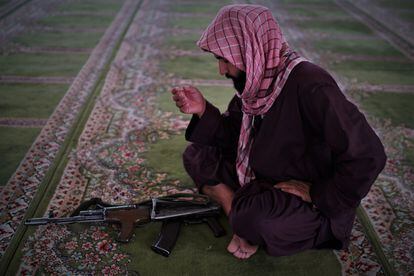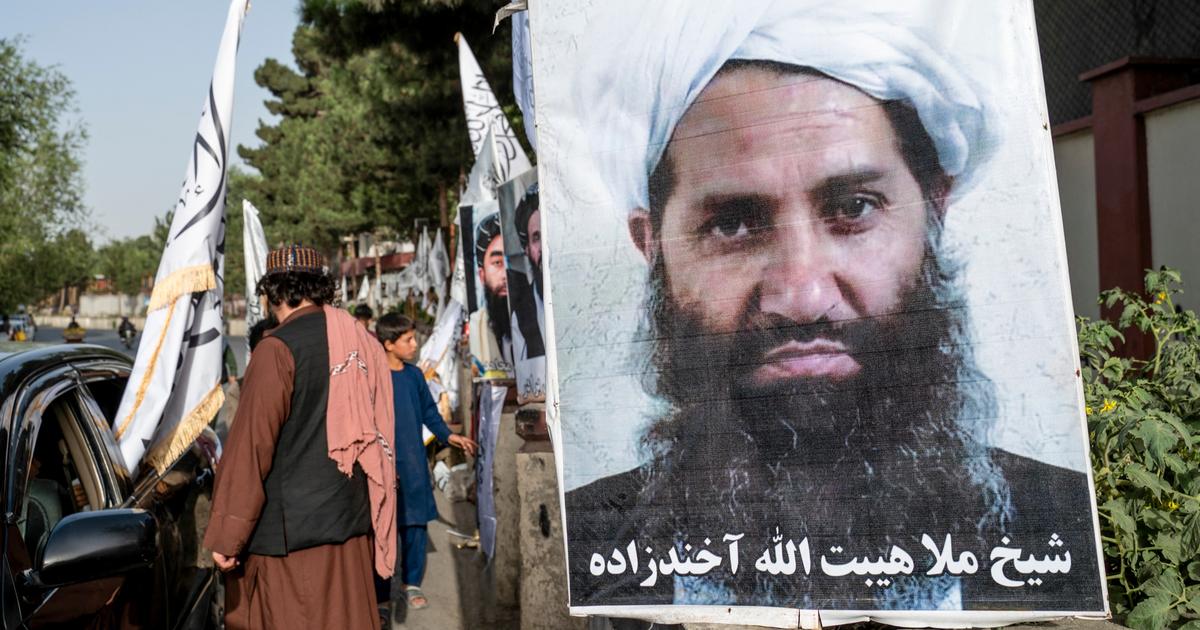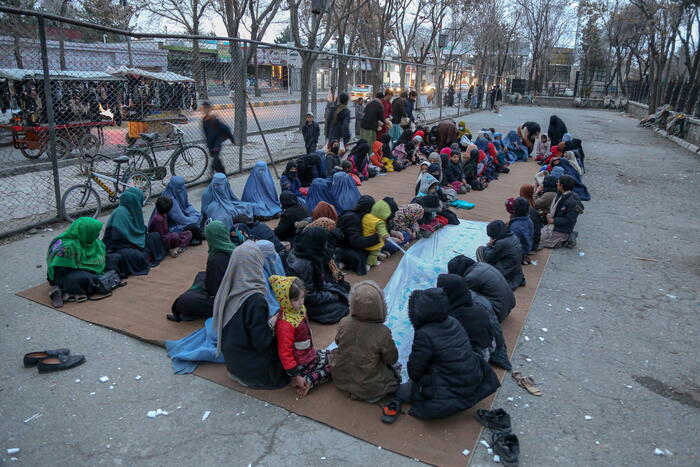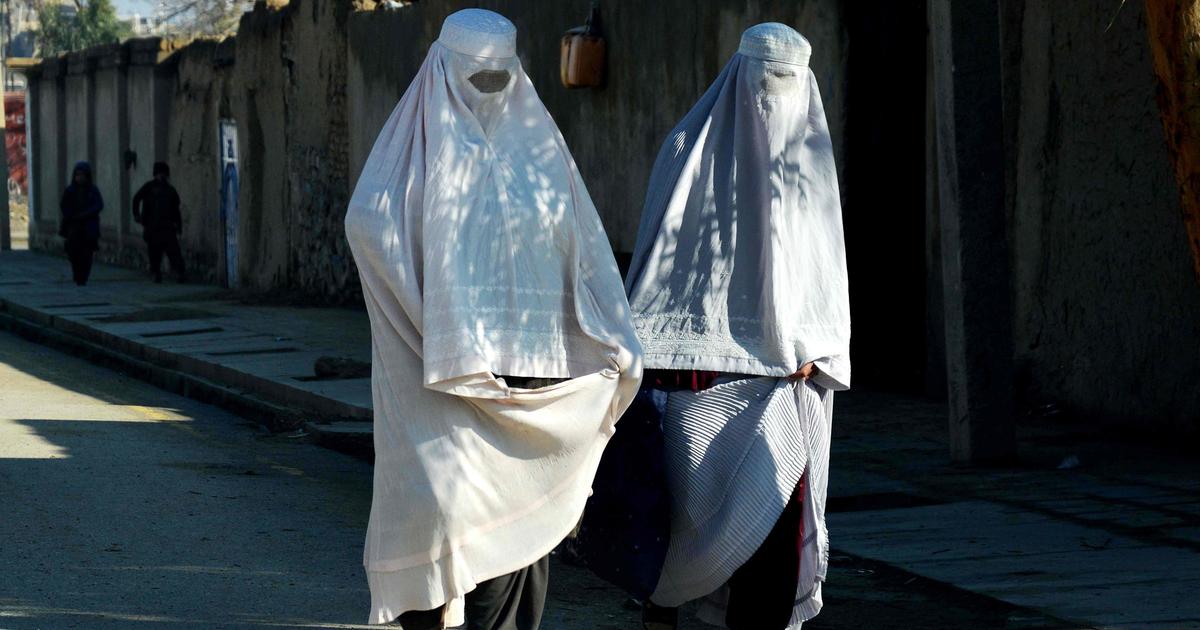It is not easy to see an Afghan man cry.
Taj Mohammad, 53, doesn't bother to wipe away the tear that runs down his left cheek.
This Saturday marks the first anniversary of the death of his son Sadiqullah, 28 years old.
He was one of the police officers trying to prevent the Taliban from taking control of Kandahar, Afghanistan's second largest city of about 600,000 people.
A scuffle at a crossroads in front of a mosque killed him and three other companions.
The fundamentalist guerrillas had achieved on the night of August 12 last year that the local forces lay down their arms.
The next day, Kandahar belonged to the Taliban, although that did not prevent deaths like those of these four agents, as well as several dozen executions of people linked to the deposed government.
In two days, on August 15,
Kandahar has been strengthened this year as the spiritual capital of the Islamic Emirate.
Mullah Mohamed Omar founded the Taliban movement (
talib
is a student, Taliban, its plural) in this province in 1994. The heir to that position, Mullah Hibatullah Akhundzada, is not part of the Government, but pulls the strings from Kandahar with hardly any presence. public and forming a kind of shadow government.
"The orders are sent from Kandahar, but the capital, the Administration and the Government are mainly in Kabul", affirms without hiding this duality of powers Maulvi Hayatullah Mubarak, deputy governor of the province, during an interview with EL PAÍS.
It is not surprising that this is the model that the Emirate looks to in order to impose its foundations.
Seeing a woman in Kandahar is not easy.
Nor is there a trace of them during Friday prayers in the mosque or in a restaurant that can be considered one of the most advanced and frequented in the city, the NFC.
The deputy governor denies that “rights” and “privileges” are being taken away from them, although some of them complain that, under the shadow of
sharia
(Islamic law), they are being further removed from the public sphere and prevented from working.
The 'sheik' Abdulbasir Sahib, a former mujahideen who now acts as imam in a mosque in Kandahar.LUIS DE VEGA
Twenty women learn a trade in a textile workshop located in the basement of a mud house on the outskirts of Kandahar.
The temperature is suffocating, all of them are completely covered and the machines with which they sew do not move with more energy than that of their hands.
Sweat causes some to show off their soaked
burkas
in the middle of the rattle.
Many are widows and appreciate being able to train and have a monthly salary of 2,000 Afghanis (about 20 euros).
Leading them all is Kochai Afghan, 30, a businesswoman who says she had to close her artisan clothing business in the city market.
Others present agree that they are no longer allowed to work in front of the public, a statement that the lieutenant governor describes as "false."
In the basement of the workshop, each testimony is a drama.
Afghan, as covered up as the others, admits that her income is the only one that enters her house, where she leaves behind two sons, two daughters and a husband addicted to hashish and alcohol.
Nuria, wearing a worn olive green
burqa
, lost her 18-year-old son Abdulsamad a year ago when the vehicle she was traveling in blew over a mine.
She first says that she is 30 years old, but when she begins to detail that she still has two sons and ten daughters left, she admits that she does not know how old she is, something more than frequent in Afghanistan.
The Taliban do not have, a year after coming to power, a plan to rescue and save the private sector, despite the fact that 80% of the economy depends on it, laments Niamatullah Niamat, 41 years old.
His dairy company, Afghan Maldar Dairy, has 50 employees who, due to the covid crisis and the economic instability caused by the change of government, are now paid 30% less.
His facilities only receive 10 hours a day of electricity supply, the rest they have to supply with generators powered by a fuel that has doubled its price.
“The private sector is dying day by day, company by company, and if the Government does nothing…”, he leaves the sentence unfinished, implying that the Emirate will not get ahead without the businessmen.
The meetings he has had with some officials, some ministers, have been of little use, he points out.
power outages
On the main streets of Kandahar there are no beggars, as there are thousands in Kabul, but it is easy to see employees empty the pipes to the right and left in which tons of mud, waste and sewage accumulate, because this city, at Like the capital, it does not have a sewage system.
In addition, power outages are still frequent.
These are problems inherited from the previous authorities that have little to do with the current management of the Taliban.
Those eternal scourges matter little to some.
"With my son alive and under the previous government, everything was going well," says Taj Mohammad, the father of the policeman who died a year ago, while assuring that he knows "nothing" about the Taliban leader.
"The Emir al Muminin (chief of the believers,
A Taliban during Friday prayers at a Kandahar mosque.
LOUIS DE VEGA
Two of the deputy governors who preceded Maulvi Hayatullah Mubarak were killed in terrorist attacks during the Taliban's campaign of attacks against the authorities of the government toppled a year ago.
One of these two cases was directly claimed by those who now hold power.
The current lieutenant governor does not miss the opportunity to reproach the reporter for the presence of Spanish troops in Afghanistan.
“The United States, the American media and their allies in the world lied and spread false propaganda about us.
I would like you to inform the people of Spain objectively about Afghanistan”, he points out while insisting that they have brought peace.
But the reality is that violence remains entrenched in the country.
Kabul has been the target of attacks in recent days.
On Thursday, shortly after the meeting with the deputy governor of Kandahar, a prominent Taliban cleric, Rahimullah Haqqani, was killed when a terrorist blew himself up in his Koranic school in the capital in an attack that hastened to claim the Islamic State (ISIS, according to its acronym in English).
This Friday, after praying in a mosque in Kandahar, the
sheikh
Abdulbasir Sahib, 50, criticizes and condemns that attack, which he says was not carried out by Muslims.
Two dozen Taliban youths, some of them armed, surround him and kiss his hand.
Moments later, silence falls to listen to his answers to the journalist.
In an impossible balance to maintain, the religious and former combatant tries to explain, without success, why the suicide attacks of the Taliban are justified and those of their rival, the ISIS, are not: “There is a big difference.
We were fighting for Islam and against the previous government and the invading troops.
They were our target."
Follow all the international information on
and
, or in
our weekly newsletter
.
50% off
Subscribe to continue reading
read without limits
Keep reading
I'm already a subscriber





/cloudfront-eu-central-1.images.arcpublishing.com/prisa/KA3LQ5ZEAFEQXOIZXJEEVDUZUQ.jpg)



